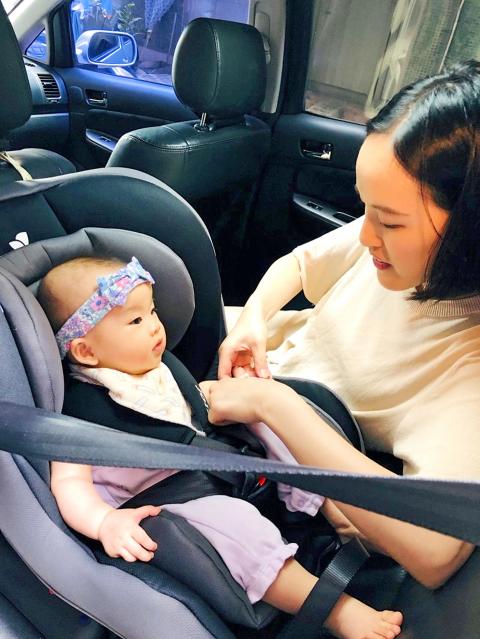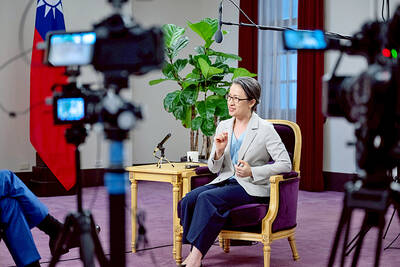Rear-facing travel seats are to be required for children aged over one and under two if amendments to the Regulations on Implementation of Child Safety Seats in Automobiles (小型車附載幼童安全乘坐實施及宣導辦法) take effect from Sept. 1 as the Ministry of Transportation and Communications plans, it said yesterday.
The date of implementation depends on the Ministry of Economic Affairs’ Bureau of Standards, Metrology and Inspection, which is to establish manufacturing standards, the transportation ministry said.
Articles 4 and 14 of the regulations state that children under the age of one, or who weigh less than 10kg, must be in rear-facing safety seats or beds, while those aged one to four who weigh 10kg to 18kg should be in safety seats in the rear.

Photo provided by a reader
The amended version states that children younger than two should travel in rear-facing safety seats or beds, while children from the age of two and under four who weigh less than 18kg should be in a safety seat, preferably rear-facing, in the back seat.
Breaches of the amended regulations would incur fines of NT$1,500 to NT$3,000, the transportation ministry said.
Department of Railways and Highways official Lee Chao-hsien (李昭賢) said that the amendments were made after suggestions by experts and studying legislation in other countries.
The forces in a crash are tremendous and the notion that mothers can protect children by holding them is wrong, Lee said.
Citing studies by the American Academy of Pediatrics, Lee said that the cervical vertebrae in a child under two have not fully developed and whiplash could snap vertebrae.
Such injuries are hard to recover from, Lee said, adding that rear-facing safety seats offer more protection, as they distribute forces that might otherwise be put on a child’s cervical vertebrae and shoulders.
The removal of weight limitations for rear-facing seats is to encourage their continued use up to age two, the transportation ministry said.
The weight limits were instituted in 2001, but the metrics and standards have changed, it said.
Rear-facing seats are recommended for children over two, but that decision is up to parents based on a child’s weight, it said.

China might accelerate its strategic actions toward Taiwan, the South China Sea and across the first island chain, after the US officially entered a military conflict with Iran, as Beijing would perceive Washington as incapable of fighting a two-front war, a military expert said yesterday. The US’ ongoing conflict with Iran is not merely an act of retaliation or a “delaying tactic,” but a strategic military campaign aimed at dismantling Tehran’s nuclear capabilities and reshaping the regional order in the Middle East, said National Defense University distinguished adjunct lecturer Holmes Liao (廖宏祥), former McDonnell Douglas Aerospace representative in Taiwan. If

TO BE APPEALED: The environment ministry said coal reduction goals had to be reached within two months, which was against the principle of legitimate expectation The Taipei High Administrative Court on Thursday ruled in favor of the Taichung Environmental Protection Bureau in its administrative litigation against the Ministry of Environment for the rescission of a NT$18 million fine (US$609,570) imposed by the bureau on the Taichung Power Plant in 2019 for alleged excess coal power generation. The bureau in November 2019 revised what it said was a “slip of the pen” in the text of the operating permit granted to the plant — which is run by Taiwan Power Co (Taipower) — in October 2017. The permit originally read: “reduce coal use by 40 percent from Jan.

‘SPEY’ REACTION: Beijing said its Eastern Theater Command ‘organized troops to monitor and guard the entire process’ of a Taiwan Strait transit China sent 74 warplanes toward Taiwan between late Thursday and early yesterday, 61 of which crossed the median line in the Taiwan Strait. It was not clear why so many planes were scrambled, said the Ministry of National Defense, which tabulated the flights. The aircraft were sent in two separate tranches, the ministry said. The Ministry of Foreign Affairs on Thursday “confirmed and welcomed” a transit by the British Royal Navy’s HMS Spey, a River-class offshore patrol vessel, through the Taiwan Strait a day earlier. The ship’s transit “once again [reaffirmed the Strait’s] status as international waters,” the foreign ministry said. “Such transits by

Taiwan is doing everything it can to prevent a military conflict with China, including building up asymmetric defense capabilities and fortifying public resilience, Vice President Hsiao Bi-khim (蕭美琴) said in a recent interview. “Everything we are doing is to prevent a conflict from happening, whether it is 2027 or before that or beyond that,” Hsiao told American podcaster Shawn Ryan of the Shawn Ryan Show. She was referring to a timeline cited by several US military and intelligence officials, who said Chinese President Xi Jinping (習近平) had instructed the Chinese People’s Liberation Army to be ready to take military action against Taiwan